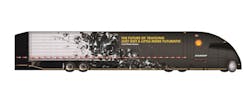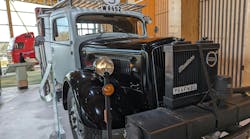LOUISVILLE, KY. Shell Lubricants is stepping outside of its traditional “fluid engineering” box in the trucking world to help sponsor the development of a new “hyper-fuel mileage” Class 8 tractor-trailer design being built by the AirFlow Truck Company and its principal owner and designer, Bob Sliwa.
At a press event here at the Mid America Trucking Show (MATS), Dave Waterman – North American marketing manager for the Shell Rotella engine oil brand – noted that this “next-generation” concept truck, nicknamed the “StarShip,” is being built by Airflow in a 6,400 ft. garage in Connecticut and should be ready for testing by late next year.
“We’ll be doing shake down testing and some regional runs by the third quarter of 2016, with coast-to-coast by the fourth quarter of 2016,” Silwa noted.
He added that he rolled out first “hyper-fuel mileage” concept vehicle, dubbed the “Bullet Truck,” back in 2012. Crafted from a 2003 model Kenworth T2000 over a period of three years, Silwa said it achieved average fuel economy of 13.4 mpg under load on aa cross-continental haul from Connecticut to California.“I actually averaged 14.1 mpg until we ran into 35 mph headwinds in Laramie, WY,” he noted.
The new “StarShip” vehicle (seen at right), however, is being built on a 2016 Navistar International ProStar chassis, which will include a 2010-compliant engine equipped with selective catalytic reduction (SCR) emission control technology.
“We’re building our own cab for this concept and will be 100% EPA certified to operate on the road,” Silwa said. He’ll be loading the StarShip tractor-trailer combination with ballast up to 65,000 lbs. gross vehicle weight; a GVW he said 70% of today’s freight-hauling trucks opera Initial He added that initial designs call for the StarShip tractor and trailer to join together into a single integrated unit.
“This will solve the problem of having a gap between the tractor and trailer, which is a big source of aerodynamic drag and loss of efficiency,” Silwa stressed.
The StarShip tractor and trailer alike will feature side skirts, hood, front end and custom interior, along with a tractor-to-trailer “active aerodynamics” gap sealer.
Both the gap sealer and trailer skirts will retract below 35 mph or when coming up on obstructions such as a railroad crossing, etc., Silwa said.
Waterman said noted that while Shell will be providing some engine and lubricant to the StarShip project, Silwa will remain the chief owner, designer and driver of the vehicle.
Waterman also emphasized that the project will use “fuel ton efficiency” as its guiding metric. “That more effectively measures fuel efficiency when fully loaded,” he explained.
Selda Gunsel, vice-president of technology for Shell Global Solutions, noted in a separate statement that the pursuit of significant fuel economy gains for class 8 trucks and trailers is a challenging process given the size and traditional construction of a tractor and trailer.
With new fuel economy regulations on the horizon and the need for continuing advances in fuel economy, Gunsel said Shell “recognized” that a “holistic approach” is needed to generated larger fuel economy gains, including advances in engine and drive train technology, the use of low viscosity synthetic lubricants, aerodynamic designs, efficient driving methods and more.
“That’s why we intend to stay at the forefront of innovation – collaborating with companies like AirFlow to develop creative solutions that will benefit the industry for years to come,” Gunsel explained.
“During our continuous on-highway testing of Shell Rotella engine oils and other lubricants, we always seek to understand how efficiencies can be gained across the whole truck,” added Chris Guerrero, global brand manager for Shell Rotella.
“Aerodynamics plays a big role in achieving higher fuel economy and we look forward to working with Bob Sliwa and AirFlow Truck Company on the evolution of an all-new hyper fuel mileage tractor and trailer,” he said.
In other news, Kate Faucher – global transport marketing projects lead for Shell Lubricants – provided an update on the PC-11 engine oil spec development process at Shell’s MATS press event:
- In development since 2013, final specs for the PC-11 category are right now expected to be released March 1, 2017;
- Two PC-11 requirements – for scuffing and compatibility with biodiesel – have officially been scratched from the PC-11 draft standard;
- Two subcategories – dubbed PC-11 A and PC-11 B – are being developed, with PC-11 A designed to backward compatible while PC-11 B won’t be;
- PC-11 B is being formulated as a thinner viscosity 30 weight oil focused on delivering maximum fuel economy, thus why it won’t be backward compatible;
- At the moment, PC-11 A will be designated CK-4 when officially licensed in 2017; PC-11 B is being tentatively titled FA-4, with the “F” standing for “fuel economy.”




